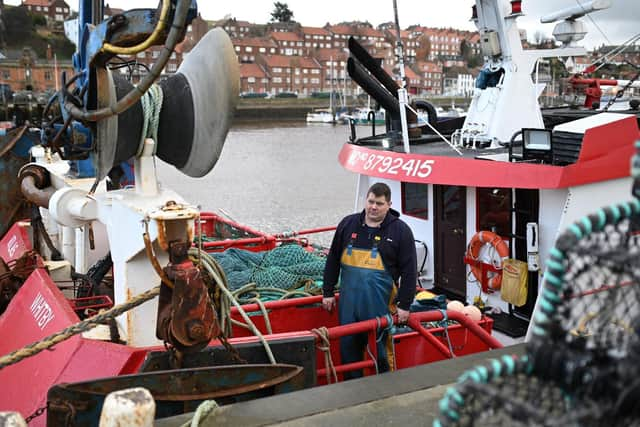Why a Brexit deal won't end 'rumblings' between British and European fishing crews
Dr Bryce Stewart, a Senior Lecturer at the University of York, said the "painful experience of the Brexit negotiations" meant it was unlikely the UK would jeopardise the deal by taking more than the agreed share of fish.
The promise that the UK would take full control of its fishing waters after decades of being bound by the European Union's Common Fisheries Policy - where quotas were set for how many of each type of fish members are allowed to catch - has been a central part of the Brexit debate.


Advertisement
Hide AdAdvertisement
Hide AdAnd in Parliament this week Commons Leader Jacob Rees-Mogg claimed that fish in British waters are "better and happier" after Brexit, which replaces a system where many British fishermen lost out to their European counterparts.
The deal agreed on Christmas Eve, creates a five and a half year adjustment period, starting from January 2021, in which the value of the catch the UK can take in its own Economic Exclusion Zone will increase incrementally up to an average of 25 per cent.
At the end of the adjustment period both sides will go back to the negotiating table, though Boris Johnson has claimed "there is no theoretical limit beyond those placed by science or conservation on the quantity of our own fish that we can fish in our waters” after this point.
But writing in a new report for the UK in a Changing Europe initiative to be published next week, fisheries biologist Dr Stewart said the trade agreement "carries an assumption that the increase in the UK catch share value will not go beyond 25 per cent after 2026.
Advertisement
Hide AdAdvertisement
Hide AdHe adds: "If there is a dispute then either side can reduce reciprocal fishing access and place tariffs on fish imports and on other goods, or ultimately suspend other parts of the trade and economic partnership. Given the painful experience of the Brexit negotiations, it seems unlikely the UK will risk either tariffs or indeed any threat to the wider agreement."
Dr Stewart said the Brexit deal commits both London and Brussels to ensuring that fishing activities for shared stocks are environmentally sustainable in the long term, and to restore populations of harvested species above levels that can produce a so-called 'maximum sustainable yield'.
He wrote: "The UK has also passed a Fisheries Act to prepare for its status as an independent coastal state. This includes encouraging objectives to take an ecosystem based approach to management, and to consider the effects of climate change on both the industry, and how fishing may reduce the resilience of ecosystems in the face of climate change.
"Furthermore, more control of its territorial waters should enable the UK to both agree and implement more effective regulations in its offshore marine protected areas. The UK — with the devolved governments — should be able to move faster on this than the EU which has been bogged down in the need to gain consensus from all affected member states."
Advertisement
Hide AdAdvertisement
Hide AdHe adds: "Although fisheries arrangements between the UK and EU are settled for now, rumblings will no doubt continue into the future. There is a dire need for a more flexible international quota sharing system that responds to the effects of climate change on fish stock distribution.
"It is also vital that the UK Government allocates its quota preferentially to vessels that contribute the most to the local economy, and that fish with the lowest environmental impact, as it committed to in its landmark Fisheries Act."
Earlier this week, it was claimed that some Scottish fishermen are now landing their catch in Denmark to avoid the "bureaucratic system" that exports to Europe now involve.
Rural Economy Secretary Fergus Ewing used a statement to Holyrood to speak out about the problem the fishing fleet had faced as a result of Brexit.
Advertisement
Hide AdAdvertisement
Hide AdExports of fresh fish and seafood have been hit by delays after the UK's transition period ended on December 31, with Tory MSP Jamie Halcro Johnston saying this "uncertainty" had resulted in some boats opting to stay in port.
Fisheries Minister Victoria Prentis was also criticised after her comment to the Lords Environment Committee that she was "very busy on Christmas Eve" when the Brexit agreement came through, "organising the local nativity trail".
Comment Guidelines
National World encourages reader discussion on our stories. User feedback, insights and back-and-forth exchanges add a rich layer of context to reporting. Please review our Community Guidelines before commenting.